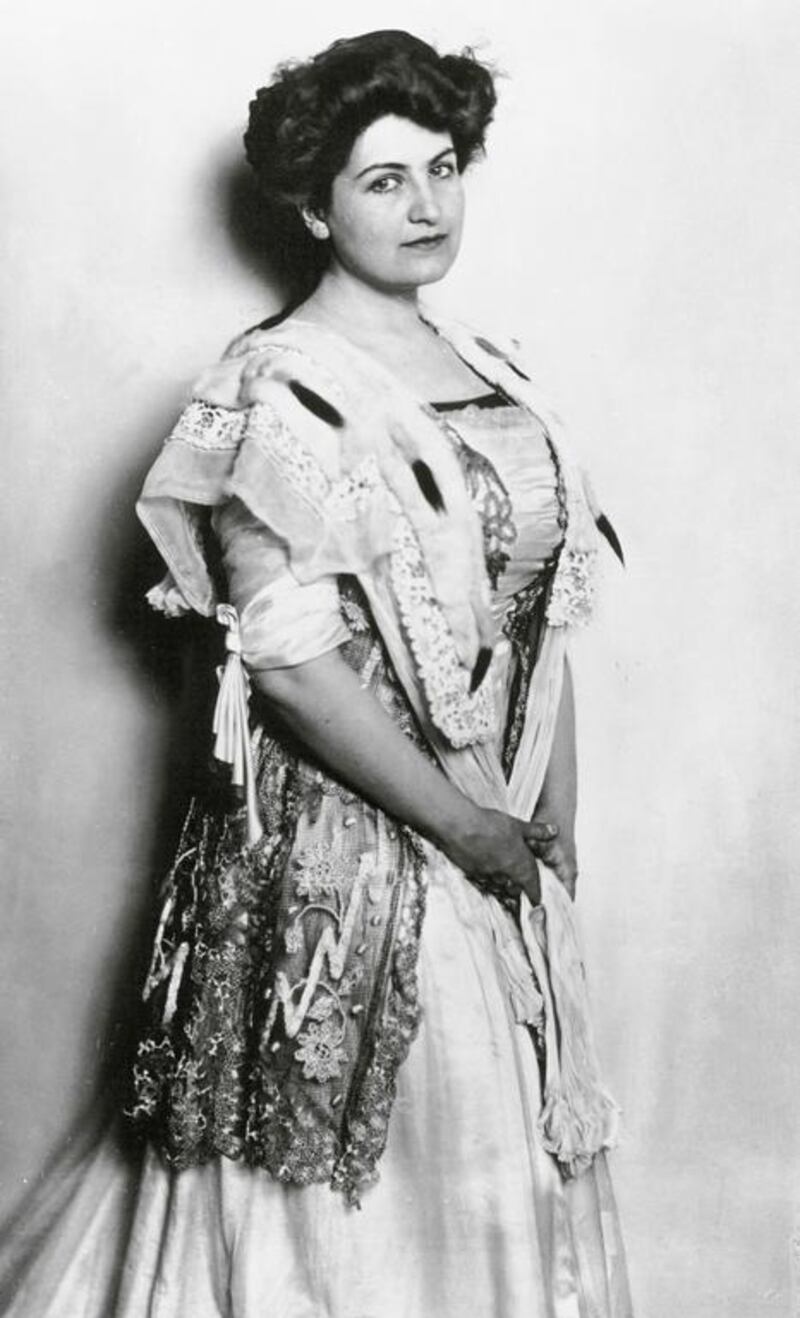Alma Mahler was described by one Viennese contemporary, Siegfried Lipiner, as “spiteful, vain and overbearing”. The philosopher Theodor Adorno called her a “monster”. And Marietta Torberg, the wife of writer Friedrich Torberg, said she was “a grande dame and, at the same time, a cesspool”.
This is largely how history remembers Mahler, the beautiful, intelligent wife of composer Gustav Mahler.
Her life spanned two world wars, taking in marriages to architect Walter Gropius, head of the legendary Bauhaus school, and celebrated author Franz Werfel – so it is perhaps not surprising that historians (and gossips) love to dine out on her story.
But there is another side to her – one that rarely gets much attention: Alma the composer.
If you are not familiar with her work, that is hardly surprising, because only 17 of her compositions survive.
Rarely performed and largely forgotten, they nonetheless have their fans. One of them is rising opera star Kate Lindsey, who has selected two of Alma's works for her debut album, Thousands of Miles, which was released on Friday.
“After their marriage ceremony, Gustav Mahler told Alma that there couldn’t be two composers in the family,” Lindsey says. “She followed orders, but I imagine there was a deep, even frustrated, creative voice within her that never truly died.
“Instead of being the ‘creator’ herself, she became the muse and support to some of the great creative minds in the decades to follow. Her voice had to emerge through the support she showed her husbands and lovers.”
Born in 1879 to a privileged family in Vienna, Alma displayed a natural flair for composition as a young woman and received lessons from Alexander von Zemlinsky, before she was forced to quit following her engagement to Gustav when she was 22.
“The role of composer, the worker’s role, falls to me,” he told her. “Yours is that of a loving companion and understanding partner … I’m asking a very great deal – and I can and may do so because I know what I have to give and will give in exchange.”
It is amazing to read such words today. In 19th-century Europe, feminism was as alien a concept as an iPhone, and female composers were pretty much non-existent.
What this denial did to Alma is hard to imagine. It is something that touched a nerve with leading UAE composer Mohammed Fairouz, who has written about the prejudice women still face in the world of classical-music.
“I think Alma Mahler became the ‘other’ Mahler very quickly, just because of her gender,” Fairouz says. “She was an excellent composer. I think she was even more impressive given the fact that she attained an extraordinary level of excellence – despite not being given the opportunities her male counterparts were given.
“In many ways, she surpassed the level, the expectations, that her male counterparts attained.”
Lindsey reveals that her interest in Alma’s music and life story stretches back many years.
“Her music is thick and full of passion and yearning – both in her choice of text and her own composition,” she says. “I’m continuously struck by the immense skill and intelligence she possessed in her writing at such a young age.
“For a pianist, her music is actually quite challenging to play, which makes me imagine what she could have accomplished had she continued to compose throughout her lifetime.”
In 2011, Fairouz and Lindsey collaborated on the song cycle Jeder Mensch, for which the pair chose sections of Alma's writings taken from her letters and diaries. Fairouz set them to music for Lindsey to perform.
Talking about the work, Fairouz says that describing Alma’s views on love and her views on spirituality was important to him, “as was, I think, describing her role as a woman in the world – not feeling free”.
While Alma’s history is heavily influenced by the way it was seen through the dominant male eyes of the day, she also played her own part in sabotaging it.
Following Gustav's death, it is known that she destroyed some letters to protect her reputation. Both her 1957 autobiography and her diary also played rather loose with the facts, leading one biographer, Oliver Hilmes, to claim in his 2015 book, Malevolent Muse: The Life of Alma Mahler, that "Alma's life achievement consisted of the composition of her own legend".
But what if this promising composer had been allowed to take a different, creative path?
“I grieve that we didn’t get the chance to see the ways in which Alma’s voice could have stood at the front of a great body of work, all her own,” Lindsey says.
Certainly, there is a sense that had Alma been a man, her reputation might be very different today.
“She was an ambitious woman; a very smart woman, a very accomplished woman,” Fairouz says. “Unfortunately, that made her somebody who had to pay a likeability tax.”
Five more composers who did not need to write much music to be revered
Suor Leonora d’Este (1515-75)
The name might not ring any bells, but Suor Leonora d'Este has an impressive claim for fame. She was the only surviving daughter of Lucrezia Borgia, the scheming aristocrat whose exploits inspired The Borgias TV series. Suor spent almost 60 years in a convent and no paintings of her survive. But musicologist professor Laurie Stras believes she was the composer of a daring and beautiful 23-part motet Salve sponsa Dei (Bride of Christ), published anonymously in 1543.
Edgar Varèse (1883-1965)
Frenchman Edgar Varèse has a towering reputation as the godfather of electronic music. After settling in New York, the composer quickly adapted his music to speak of the modern machine age. Compositions such as Integrales, Ionisation and Déserts build up masses of sound and include effects such as wailing sirens and taped effects. With his influence stretching to the likes of Frank Zappa and Harrison Birtwistle, it is amazing to think his surviving works can almost fit onto two CDs.
Paul Dukas (1865-1935)
Would we still be talking about French composer Paul Dukas if his most famous work, L'apprenti Sorcier (The Sorcerer's Apprentice), hadn't ended up in Disney's Fantasia? Almost certainly. The fun of seeing a flustered Mickey Mouse flood his basement thanks to a botched spell is hard to forget – but so is Ducas's catchy melody and rip-roaring orchestration. If this piece encourages you to explore more of the composer's music, however, you will be in for a shock. The notorious perfectionist destroyed most of his adult works – only 14 survive, including an opera, Ariane et Barbe-bleue (Ariane and Bluebeard), a symphony and a ballet, La Péri (Peri).
Anton Webern (1883-1945)
Three composers led a charge during which the 19th-century’s lush Romantic sounds were ripped apart by atonal modernism: Arnold Schoenberg and his pupils Anton Webern and Alban Berg. They shocked Vienna when they jettisoned “tunes” and tradition during the early 1900s. Arguably the most radical of the three, Webern adopted a singular style that created shock waves throughout the rest of the century (even Schoenberg’s arch enemy, Igor Stravinsky, eventually warmed). Notoriously concise, with some compositions only coming in at a few minutes long, only 31 of his works were published in his lifetime – together, they can be played in just a few hours.
Alban Berg (1885-1935)
The youngest of the three Viennese modernists (see above), Alban Berg was perhaps the most commercially successful. His career started rather late (he began formal musical training with Schoenberg in 1904), and ended all too early (he died at the age of 50 from blood poisoning caused by an insect sting), but although only 18 or so mature works exist, they all pack a punch. Unlike those written by his associates Schoenberg and Webern, Berg's compositions aren't just hugely influential, but they can also pull in the crowds – especially the operas Lulu and Wozzeck, and the elegiac Violin Concerto.
artslife@thenational.ae










